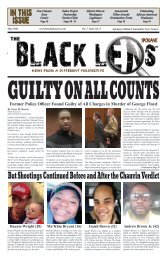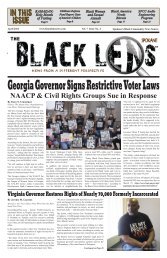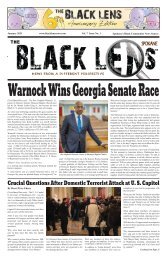Black Lens - October 2021
The Black Lens in an independent , community newspaper, published monthly and based in Spokane, WA, that covers then news, people, information and issues that are of importance to the Black community.
The Black Lens in an independent , community newspaper, published monthly and based in Spokane, WA, that covers then news, people, information and issues that are of importance to the Black community.
Create successful ePaper yourself
Turn your PDF publications into a flip-book with our unique Google optimized e-Paper software.
The <strong>Black</strong> <strong>Lens</strong> Spokane<br />
www.blacklensnews.com <strong>October</strong> <strong>2021</strong><br />
Page 15<br />
THE BLACK Airway Heights<br />
PRISONERS CAUCUS<br />
Do Young <strong>Black</strong> Males Have a Right to a Reasonable Bond?<br />
By Harry “Brocq” Whitman<br />
Imagine the following vignette: two young<br />
brothers are arrested for the first time and<br />
charged with crimes. A day or two later they<br />
appear in court. A brief hearing is held. The<br />
prosecutor says the defendants are dangerous<br />
and will not appear in court. The court<br />
appointed attorney says they aren’t and they<br />
will. No regularly admissible evidence is received.<br />
The judge says, “I sentence you both<br />
too, oh, 3, 6, 12 months or more in the county<br />
jail.”<br />
Now, this might seem like a mildly amusing<br />
sketch in a review lampooning our local<br />
bench and bar. Yet, this is actually occurring<br />
as we speak in the case of the Fletcher brothers<br />
and it occurs routinely and even casually<br />
in Spokane County courts, every day.<br />
To be sure, the words the judge utters are different,<br />
but the effect is essentially the same.<br />
The judge said, “bail is set in the amount of<br />
$675,000 for J. Fletcher and $500,000 for R.<br />
Fletcher…” Which was more than their family<br />
could afford to post, and the brothers were<br />
taken to jail for months, or perhaps a year or<br />
more.<br />
Bail set in an amount that cannot be posted is<br />
in effect summarily to impose a sentence, before<br />
trial, of a duration equal to the time until<br />
the trial, which is sometimes many months<br />
or a year or more. If the judge had handed<br />
down a sentence before the trial, there would<br />
have been universal outrage. But is there a<br />
difference, in any real sense, between denying<br />
bail altogether and setting bail too high<br />
for a defendant to post? And is there any real<br />
A Case Study: J. Fletcher & R. Fletcher<br />
difference between that and sentencing them?<br />
What is the difference, other than semantics?<br />
These brothers are presumed innocent.<br />
They’ve had no trial. They have experienced<br />
nothing that could in seriousness be called<br />
due process of law. Their mother and father<br />
are both working parents struggling like all<br />
other parents to raise their children and make<br />
ends meet.<br />
This happens regularly to those who are<br />
almost without exception relatively poor,<br />
predominantly people of color, and mostly<br />
young men. No one appears to be troubled<br />
by this. Indeed, indignation is aroused only<br />
when the court departs from this routine and<br />
releases someone else’s child or loved one<br />
before trial.<br />
Bail is not a tool of law enforcement, though<br />
it is often used that way. It is not a form of<br />
punishment, though it often has that effect.<br />
It is not a privilege of the wealthy or the well<br />
behaved or the white, though in practice it often<br />
seems to be. Bail is a right, an absolute<br />
constitutional right, and any discussion that<br />
begins from any other premise is misguided<br />
and treacherous.<br />
The Washington Constitution provides in Article<br />
1, Section 14 “excessive bail shall not be<br />
required…” This is substantially identical to<br />
Amendment VIII of the United States Constitution,<br />
but the following language in the<br />
Washington Constitution’s Article 1, Section<br />
20 is not: “all persons charged with crime<br />
shall be bailable by sufficient sureties, except<br />
for capital offenses when the proof is evident,<br />
or the presumption great.”<br />
This is the crucial provision, and it has been<br />
astonishingly neglected by lawyers and judges<br />
in this county. It is straightforward enough<br />
or seems so. All persons are entitled to bail<br />
before conviction. The situation is essentially<br />
this, the law and theory in Washington by<br />
clear Constitutional command, by statute, by<br />
rule, and longstanding Supreme Court precedent<br />
is that all persons charged with crimes<br />
are bailable. The practice and reality here,<br />
however, are something quite different. Spokane<br />
County has a form of de facto and ad<br />
hoc preventive detention in which the law<br />
and the constitution are being ignored, and in<br />
being ignored, violated.<br />
Prosecutors are the least to blame for this<br />
state of affairs. They are advocates and they<br />
represent the public at large in an adversarial<br />
process. It is to be expected, therefore, that<br />
they will routinely seek the highest bail and<br />
most restrictive forms of release. A prosecutor<br />
must not, of course, willfully deny or violate<br />
a defendant’s rights.<br />
The defense bar bears a heavier responsibility,<br />
for it is they who, in this adversarial<br />
system, that must identify defendants’ rights<br />
and do all they can to vindicate them. As to<br />
the constitutional bail question, defense lawyers<br />
rarely mention either the Washington<br />
Constitution or the several important judicial<br />
decisions on the issue. This is a serious and<br />
widespread failure of advocacy.<br />
Perhaps the explanation for the silence of the<br />
lawyers on this important issue is to be found<br />
where ultimate responsibility and therefore<br />
ultimate blame lies, that is, with judges. For<br />
the duty to protect and enforce the constitution<br />
is of course ultimately with judges.<br />
What point can there be to the job, indeed<br />
what point can there be to a constitutional<br />
system, if judges do not first and always recognize<br />
when the constitution is implicated in<br />
a situation and then enforce that constitution<br />
according to their best information and understanding<br />
and with courage?<br />
At the very least, and contrary to popular<br />
belief, the constitution creates a very strong<br />
presumption that every defendant should be<br />
released before trial. In other words, that bail<br />
should be set in an amount he or she can post.<br />
A very heavy burden rests (or should) with<br />
anyone who would seek to justify another<br />
result even in the most serious cases. Why<br />
should simple justice be denied any citizen,<br />
however fallen, degraded or guilty, he may<br />
be?<br />
The chief end of government is the protection<br />
of the rights of all, the bad no less than<br />
the good. It does not require a constitutional<br />
scholar to perceive the immediate applicability<br />
to the Fletcher Brothers case. It is simply<br />
a matter of protecting the most basic rights of<br />
those who our society apparently thinks least<br />
deserves them, young black men...<br />
Founded in 1972 by African American men incarcerated<br />
at the Washington State Reformatory<br />
in Monroe, the purpose of the <strong>Black</strong> Prisoners’<br />
Caucus (BPC) is “to provide a medium for <strong>Black</strong><br />
prisoners to work collectively to improve our family<br />
relationships, our facility, and the communities<br />
that we are absent from but still belong to.” For<br />
more information visit: blackprisonerscaucus.<br />
org or on Facebook @blackprisonerscaucus.<br />
Persistence<br />
"WE DO JUSTICE."<br />
WAY TO JUSTICE<br />
THE<br />
845 S. SHERMAN<br />
SPOKANE, WA 99202<br />
(509) 822-7514<br />
www.thewaytojustice.com<br />
OUR PROGRAMS:<br />
DRIVER'S RELICENSING<br />
RECORD VACATING*<br />
LFO REDUCTION<br />
RIGHTS RESTORATION<br />
*Including State v. Blake<br />
Administrative Appeals Civil Rights Complex Family Law Criminal Defense<br />
Domestic Violence Juvenile Family Law Mediation Victims Rights<br />
The Law Office of D.C. Cronin | 724 N. Monroe St. Spokane | (509) 328-5600
















